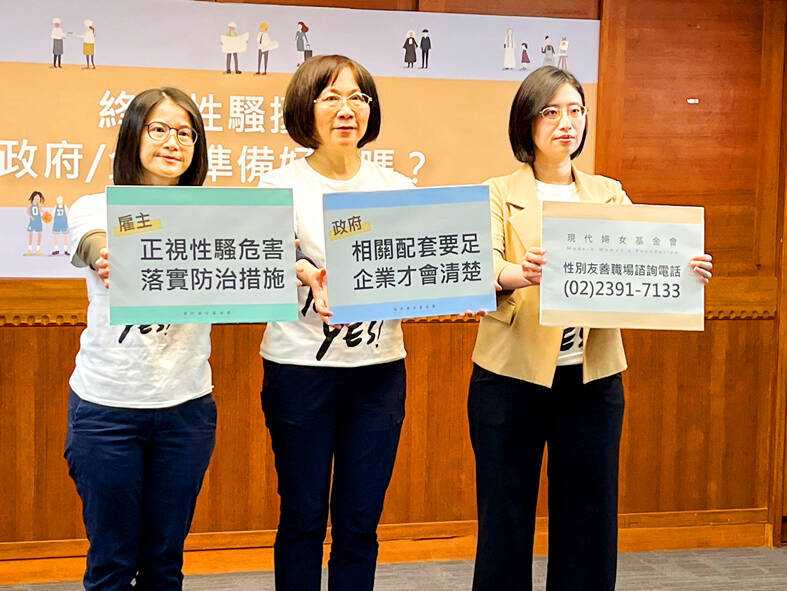The Modern Women’s Foundation yesterday urged the government to take more action to ensure the effectiveness of a slew of amendments to gender equality laws scheduled to go into effect on Friday next week to protect women at the workplace.
In July last year, lawmakers amended the “three gender equality laws,” a term referring to the Sexual Harassment Prevention Act (性騷擾防治法), Gender Equality in Employment Act (性別平等工作法) and Gender Equity Education Act (性別平等教育法).
The amendments were designed to strengthen legal protections for women and facilitate the prosecution of offenders by defining power abuse in sexual harassment, corporate responsibility, sentencing rules and other guidelines, the Judicial Yuan wrote in a news release at the time.

Photo: CNA
They additionally include provisions for sensitivity training in public and private institutions, victim support and counseling services, statutes of limitation extensions for some circumstances, and obligations for schools including police and military academies.
However, foundation members yesterday said that government diligence is needed to implement the measures, ensure corporate compliance and resolve potential contradictions in the newly changed laws.
The foundation’s Taipei-based call center from July to December last year received 235 phone calls, 33 percent of which were requests for assistance in workplace-related sexual harassment incidents, chairwoman Jennifer Wang (王如玄) told a news conference hosted at the Taipei Bar Association.
Men and women accounted for 15 percent and 85 percent of the callers respectively, she said.
A total of 48 percent of the callers reported incidents that fall under the jurisdiction of the Sexual Harassment Prevention Act, 34 percent of the incidents reported fall under the Gender Equity in Employment Act and 74 percent of the callers made inquiries about issues concerning the law or procedures for making an official complaint.
In addition, 35 percent asked about their eligibility for mental or physical care and 33 percent complained about employers allegedly mishandling reports of sexual harassment, Wang said.
According to the law invoked, a person wishing to make a report about sexual harassment would need to go through a distinct and separate set of legal procedures, as each of the laws was designed for different ends, she said.
Citing an example, Wang said that the Gender Equality in Employment Act mandates that employers internally address sexual harassment incidents reported to them by their workers, while the Sexual Harassment Prevention Act prioritizes punishing abusers.
The government did not create a guideline to specify which of the laws should be applied in any given situation, nor did it clarify management responsibilities after an employee makes a report or policies for rendering aid to victims, she said.
The potential conflict in the applicability of the two acts means hospitals instead of law enforcement could be designated as the party responsible for investigating or punishing patients accused of harassing nurses, Wang said.
Profit-seeking enterprises must be made to understand that turning a blind eye to sexual harassment would result in prohibitively high losses before cultural changes can happen in Taiwanese workplaces, she added.

Chinese Nationalist Party (KMT) Chairman Eric Chu (朱立倫), spokeswoman Yang Chih-yu (楊智伃) and Legislator Hsieh Lung-chieh (謝龍介) would be summoned by police for questioning for leading an illegal assembly on Thursday evening last week, Minister of the Interior Liu Shyh-fang (劉世芳) said today. The three KMT officials led an assembly outside the Taipei City Prosecutors’ Office, a restricted area where public assembly is not allowed, protesting the questioning of several KMT staff and searches of KMT headquarters and offices in a recall petition forgery case. Chu, Yang and Hsieh are all suspected of contravening the Assembly and Parade Act (集會遊行法) by holding

PRAISE: Japanese visitor Takashi Kubota said the Taiwanese temple architecture images showcased in the AI Art Gallery were the most impressive displays he saw Taiwan does not have an official pavilion at the World Expo in Osaka, Japan, because of its diplomatic predicament, but the government-backed Tech World pavilion is drawing interest with its unique recreations of works by Taiwanese artists. The pavilion features an artificial intelligence (AI)-based art gallery showcasing works of famous Taiwanese artists from the Japanese colonial period using innovative technologies. Among its main simulated displays are Eastern gouache paintings by Chen Chin (陳進), Lin Yu-shan (林玉山) and Kuo Hsueh-hu (郭雪湖), who were the three young Taiwanese painters selected for the East Asian Painting exhibition in 1927. Gouache is a water-based

Taiwan would welcome the return of Honduras as a diplomatic ally if its next president decides to make such a move, Minister of Foreign Affairs Lin Chia-lung (林佳龍) said yesterday. “Of course, we would welcome Honduras if they want to restore diplomatic ties with Taiwan after their elections,” Lin said at a meeting of the legislature’s Foreign Affairs and National Defense Committee, when asked to comment on statements made by two of the three Honduran presidential candidates during the presidential campaign in the Central American country. Taiwan is paying close attention to the region as a whole in the wake of a

OFF-TARGET: More than 30,000 participants were expected to take part in the Games next month, but only 6,550 foreign and 19,400 Taiwanese athletes have registered Taipei city councilors yesterday blasted the organizers of next month’s World Masters Games over sudden timetable and venue changes, which they said have caused thousands of participants to back out of the international sporting event, among other organizational issues. They also cited visa delays and political interference by China as reasons many foreign athletes are requesting refunds for the event, to be held from May 17 to 30. Jointly organized by the Taipei and New Taipei City governments, the games have been rocked by numerous controversies since preparations began in 2020. Taipei City Councilor Lin Yen-feng (林延鳳) said yesterday that new measures by